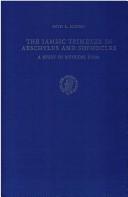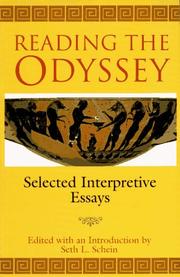| Listing 1 - 10 of 10 |
Sort by
|
Book
ISBN: 0520051289 Year: 1984 Publisher: Berkeley University of California press
Abstract | Keywords | Export | Availability | Bookmark
 Loading...
Loading...Choose an application
- Reference Manager
- EndNote
- RefWorks (Direct export to RefWorks)
Achilles (Greek mythology) in literature --- Epic poetry, Greek --- -Heroes in literature --- Trojan War --- -Mythology, Greek --- Greek epic poetry --- Epic poetry, Classical --- Greek poetry --- History and criticism --- Literature and the war --- Homer --- -Characters --- -Achilles --- Achilles (Greek mythology) in literature. --- Heroes in literature. --- History and criticism. --- Literature and the war. --- -History and criticism --- -Hóiméar --- Hūmīrūs --- Homeros --- Homerus --- Gomer --- Omir --- Omer --- Omero --- Ho-ma --- Homa --- Homérosz --- האמער --- הומירוס --- הומר --- הומרוס --- هومر --- هوميروس --- 荷马 --- Ὅμηρος --- Гамэр --- Hamėr --- Омир --- Homero --- 호메로스 --- Homerosŭ --- Homērs --- Homeras --- Хомер --- ホメーロス --- ホメロス --- Гомер --- Homeri --- Hema --- Pseudo-Homer --- Pseudo Omero --- Characters --- -Greek epic poetry --- -Homer --- Homère --- Heroes in literature --- Homer. --- Achilles. --- Hóiméar

ISBN: 9004059490 Year: 1979 Publisher: Leiden Brill
Abstract | Keywords | Export | Availability | Bookmark
 Loading...
Loading...Choose an application
- Reference Manager
- EndNote
- RefWorks (Direct export to RefWorks)
Greek language --- Iambic trimeter. --- Tragedy. --- Metrics and rhythmics. --- Aeschylus --- Sophocles --- Versification. --- -Iambic trimeter --- Trimeter, Iambic --- -Sophocles --- -Sophocle --- Sófocles --- Sofoklis --- Sofokl --- Sūfūklīs --- Sūtmūklīs --- Sofokŭl --- סופוקלס --- سوفوكليس --- Σοφοκλῆς --- Eskhil --- Eschylus --- Aischylos --- Esquilo --- Eschilo --- Aiskhilos --- Eshil --- Æskílos --- Ajschylos --- Eschil --- Eschyle --- Äschylos --- Eskili --- Aiszkhülosz --- Eschylos --- Iskilos --- Эсхил --- אייסכילוס --- איסכילאס --- איסכילוס --- إيسخولوس --- ايسخيلوس --- Αἰσχύλος --- Iambic trimeter --- Tragedy --- Drama --- Versification --- Metrics and rhythmics --- Sofokles --- Sophocle --- Sofocle --- Sophokles --- Sofocles --- Poetry
Book
ISBN: 9780521681438 9780521862776 052168143X Year: 2013 Publisher: Cambridge : Cambridge University Press,
Abstract | Keywords | Export | Availability | Bookmark
 Loading...
Loading...Choose an application
- Reference Manager
- EndNote
- RefWorks (Direct export to RefWorks)
Book
ISBN: 1108412963 9781108420082 9781108412964 1108420087 Year: 2022 Publisher: Cambridge Cambridge University Press
Abstract | Keywords | Export | Availability | Bookmark
 Loading...
Loading...Choose an application
- Reference Manager
- EndNote
- RefWorks (Direct export to RefWorks)
"The Iliad is organized according to two complementary, mutually reinforcing artistic principles, one related to its traditional narrative and mythological content, the other to its symmetrical form and to eighth-century aesthetic norms. The narrative moves linearly toward the death of Achilles and the fall of Troy, both of which, as Homer's audiences knew, will follow shortly after the burial of Hektor with which the Iliad concludes, and both of which are anticipated with increasing frequency in the course of the poem. In the mortal world of the Iliad, the movement toward death is a one-way movement, an overriding reality that lends the poem much of its power as a representation of the human condition. Nevertheless, as Aristotle observed, unlike other epic poets who told in chronological order everything that was supposed to have happened in the course of the events they described, Homer organized the Iliad and Odyssey thematically, rather than chronologically, each around a single subject - the wrath of Achilles and its consequences and the man Odysseus and his return home - and gave them an organic unity in which, in the case of the Iliad, the death of Achilles and fall of Troy have no place. Even so, most events in the poem are told in the order in which they occur; there is nothing like the extraordinarily complex narrative form of the Odyssey, with its multiple plots, its movement back and forth in time, its numerous internal narrators and narrative perspectives, and its constant change of locale"--
Homer. - Iliad. - Book 1 --- Trojan War --- Homer. --- Achilles --- Achìe --- Achilas --- Achille --- Achilleus --- Achilli --- Ahil --- Ahile --- Ahilej --- Ahillejs --- Aĥilo --- Aichill --- Akhilles --- Akhilleus --- Akhilleusz --- Akiles --- Akili --- Akille --- Akilles --- Akkilles --- Aquiles --- Aquilles --- Axill --- Axilles --- Ἀχιλλεύς --- آخيل --- アキレウス --- Akireusu --- 아킬레우스 --- 阿喀琉斯 --- Ахіл --- Ахил --- Ахилл --- Akhill --- Ахіллес --- אכילס --- Akhiles

ISBN: 0691044392 9780691044392 Year: 1996 Publisher: Princeton (N.J.): Princeton university press,
Abstract | Keywords | Export | Availability | Bookmark
 Loading...
Loading...Choose an application
- Reference Manager
- EndNote
- RefWorks (Direct export to RefWorks)
Book
Year: 1979 Publisher: Leiden Brill
Abstract | Keywords | Export | Availability | Bookmark
 Loading...
Loading...Choose an application
- Reference Manager
- EndNote
- RefWorks (Direct export to RefWorks)
Book
ISBN: 9780199589418 0199589410 0191808458 0191057851 9780191057854 Year: 2016 Publisher: Oxford [etc.] Oxford University Press
Abstract | Keywords | Export | Availability | Bookmark
 Loading...
Loading...Choose an application
- Reference Manager
- EndNote
- RefWorks (Direct export to RefWorks)
Homeric Epic and its Reception, comprising twelve chapter--some previously published but revised for this collection, and others appearing here in print for the first time--offers literary interpretations of the Iliad, the Odyssey, and the Homeric Hymn to Aphrodite. While some chapters closely study the diction, meter, style, and thematic resonance of particular passages and episodes in the Iliad and the Odyssey, others followdiverse pathways into the interpretation of the epics, including mythological allusion, intertextuality, the metrics of the Homeric hexameter, and the fundamental contrast between divinity and humanity. Also included are two chapters which focus on the work of Milman Parry and Ioannis Kakridis, founders of the two most fruitfultwentieth-century scholarly approaches to Homeric scholarship: the study of the Iliad and the Odyssey as traditional oral formulaic poetry (Parry), and the study of the poems' adaptations and transformations of traditional mythology, folktales, and poetic motifs in accordance with their distinctive themes and poetic purposes (Kakridis). The volume draws to a close with three chapters which discuss some of the most compelling poetic and critical receptions of the Iliad and the Odyssey since thelate nineteenth century, and the institutional reception of the epics in colleges and universities in the United States over the past two centuries. Written over a period of 45 years, this collection reflects the authors long-standing interest in, and scholarly and critical approaches to, theliterary interpretation of Homeric poetry.
Epic poetry, Greek --- History and criticism --- Homer. --- Epic poetry, Greek. --- History and criticism. --- Hymn to Aphrodite (Homeric hymn 5) --- Hymn to Aphrodite. --- Iliad (Homer). --- Odyssey (Homer). --- Hymn to Aphrodite (Homeric hymn 5). --- Homer --- E-books --- Epic poetry, Greek - History and criticism --- Homer - Iliad --- Homer. - Odyssey
Book

ISBN: 9780691214146 Year: 2020 Publisher: Princeton, NJ
Abstract | Keywords | Export | Availability | Bookmark
 Loading...
Loading...Choose an application
- Reference Manager
- EndNote
- RefWorks (Direct export to RefWorks)
Book

ISBN: 2713226074 2713223202 Year: 2017 Publisher: Paris-Athènes : Éditions de l’École des hautes études en sciences sociales,
Abstract | Keywords | Export | Availability | Bookmark
 Loading...
Loading...Choose an application
- Reference Manager
- EndNote
- RefWorks (Direct export to RefWorks)
Dossier : Comment se définissent et se construisent les émotions en Grèce ancienne ? Comment sont elles instrumentalisées ? Différents types d’émotions (la douleur, l’amour, la jalousie, le dégoût, la haine, la colère, etc.), leur valeur, leur place et leurs fonctions sont analysés. Les auteurs se demandent si et en quoi, pour les Anciens, leur perception, leur description et leur compréhension, ainsi que leur pratique diffèrent des nôtres. Varia : Les articles proposés ensuite abordent des documents et des thématiques variés : ainsi l'archéologie des concours dits panhelléniques au début du ve siècle avant notre ère, la représentation de l'espace dans la céramique grecque et la signification des « grands yeux » dessinés sur certains vases, la scientia sexualis à partir du corpus Peri aphrodisiôn, et les rapports énigmatiques de Cornelius de Pauw avec la justice athénienne.
Classics --- History --- emotion --- affective history --- Homer --- Plato --- fear --- erôs --- envy --- etiology --- agathoi --- tragedy --- hatred --- pathos --- persona --- anger --- hubris --- epinikia --- identity --- heroic cult --- grief --- gynaikonitis («women’s quarter») --- aphrodisia --- émotion --- sensibilité --- Platon --- Homère --- peur --- jalousie --- funérailles --- patrios nomos --- Sophocle --- tragédie --- héroïsme --- Eschyle --- colère --- concours --- épinicie --- logos --- identités --- étiologie --- to daimonion --- regard --- gynécée --- médecine --- historiographie
Book

ISBN: 9783110214529 3110214520 9786612295942 1282295942 3110214539 9783110214536 9781282295940 3110482363 Year: 2009 Volume: 4 Publisher: Berlin Boston
Abstract | Keywords | Export | Availability | Bookmark
 Loading...
Loading...Choose an application
- Reference Manager
- EndNote
- RefWorks (Direct export to RefWorks)
The categories of classical narratology have been successfully applied to ancient texts in the last two decades, but in the meantime narratological theory has moved on. In accordance with these developments, Narratology and Interpretation draws out the subtler possibilities of narratological analysis for the interpretation of ancient texts. The contributions explore the heuristic fruitfulness of various narratological categories and show that, in combination with other approaches such as studies in deixis, performance studies and reader-response theory, narratology can help to elucidate the content of narrative form. Besides exploring new theoretical avenues and offering exemplary readings of ancient epic, lyric, tragedy and historiography, the volume also investigates ancient predecessors of narratology.
Greek literature --- Narration (Rhetoric) --- History and criticism. --- History. --- History and criticism --- History --- Rhetoric --- Discourse analysis, Narrative --- Narratees (Rhetoric) --- Greek Literature. --- Latin Literature. --- Narratology. --- Narration --- Analyse du discours narratif --- Littérature antique --- Histoire et critique --- Littérature antique
| Listing 1 - 10 of 10 |
Sort by
|

 Search
Search Feedback
Feedback About UniCat
About UniCat  Help
Help News
News